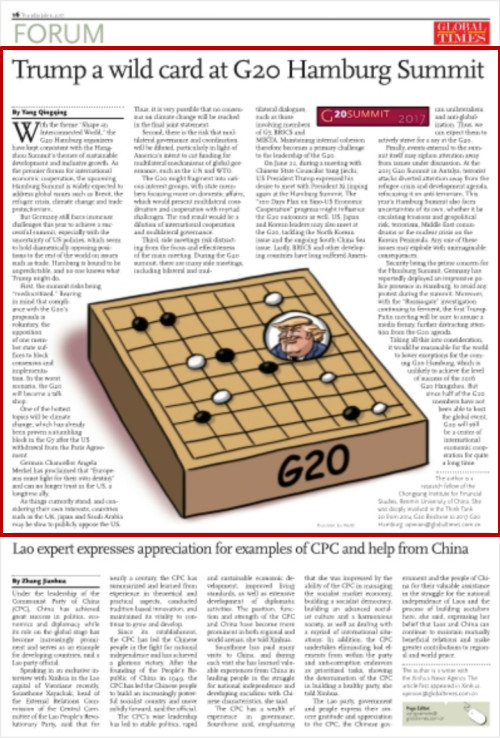Global Governance
Your Present Location: PROGRAMS> Global GovernanceYang Qingqing: Trump a wild card at G20 Hamburg Summit
By Yang Qingqing Source: Global Times Published: 2017-7-5
With the theme "Shape an Interconnected World," the G20 Hamburg organizers have kept consistent with the Hangzhou Summit`s themes of sustainable development and inclusive growth. As the premier forum for international economic cooperation, the upcoming Hamburg Summit is widely expected to address global issues such as Brexit, the refugee crisis, climate change and trade protectionism.
But Germany still faces immense challenges this year to achieve a successful summit, especially with the uncertainty of US policies, which seem to hold diametrically opposing positions to the rest of the world on issues such as trade. Hamburg is bound to be unpredictable, and no one knows what Trump might do.

First, the summit risks being "mediocritized." Bearing in mind that compliance with the G20`s proposals is voluntary, the opposition of one member state suffices to block consensus and implementation. In the worst scenario, the G20 will become a talk shop.
One of the hottest topics will be climate change, which has already been proven a stumbling block in the G7 after the US withdrawal from the Paris Agreement.
German Chancellor Angela Merkel has proclaimed that "Europeans must fight for their own destiny" and can no longer trust in the US, a longtime ally.
As things currently stand, and considering their own interests, countries such as the UK, Japan and Saudi Arabia may be slow to publicly oppose the US. Thus, it is very possible that no consensus on climate change will be reached in the final joint statement.
Second, there is the risk that multilateral governance and coordination will be diluted, particularly in light of America`s intent to cut funding for multilateral mechanisms of global governance, such as the UN and WTO.
The G20 might fragment into various interest groups, with state members focusing more on domestic affairs, which would present multilateral coordination and cooperation with myriad challenges. The end result would be a dilution of international cooperation and multilateral governance.
Third, side meetings risk distracting from the focus and effectiveness of the main meeting. During the G20 summit, there are many side meetings, including bilateral and multilateral dialogues, such as those involving members of G7, BRICS and MIKTA. Maintaining internal cohesion therefore becomes a primary challenge to the leadership of the G20.
On June 22, during a meeting with Chinese State Councilor Yang Jiechi, US President Trump expressed his desire to meet with President Xi Jinping again at the Hamburg Summit. The "100 Days Plan on Sino-US Economic Cooperation" progress might influence the G20 outcomes as well. US, Japan and Korean leaders may also meet at the G20, tackling the North Korean issue and the ongoing South China Sea issue. Lastly, BRICS and other developing countries have long suffered American unilateralism and anti-globalization. Thus, we can expect them to actively strive for a say at the G20.
Finally, events external to the summit itself may siphon attention away from issues under discussion. At the 2015 G20 Summit in Antalya, terrorist attacks diverted attention away from the refugee crisis and development agenda, refocusing it on anti-terrorism. This year`s Hamburg Summit also faces uncertainties of its own, whether it be escalating tensions and geopolitical risk, terrorism, Middle East conundrums or the nuclear crisis on the Korean Peninsula. Any one of these issues may explode with unimaginable consequences.
Security being the prime concern for the Hamburg Summit, Germany has reportedly deployed an impressive police presence in Hamburg, to avoid any protest during the summit. Moreover, with the "Russia-gate" investigation continuing to ferment, the first Trump-Putin meeting will be sure to arouse a media frenzy, further distracting attention from the G20 agenda.
Taking all this into consideration, it would be reasonable for the world to lower exceptions for the coming G20 Hamburg, which is unlikely to achieve the level of success of the 2016 G20 Hangzhou. But since half of the G20 members have not been able to host the global event, G20 will still be a center of international economic cooperation for quite a long time.
The author is a research fellow and director of Research Cooperation Department at Chongyang Institute for Financial Studies, Renmin University of China. She was deeply involved in the Think Tank 20 from 2014 G20 Brisbane to 2017 G20 Hamburg.
Key Words: G20;Trump;climate change;Yang Qingqing























































































 京公网安备 11010802037854号
京公网安备 11010802037854号





